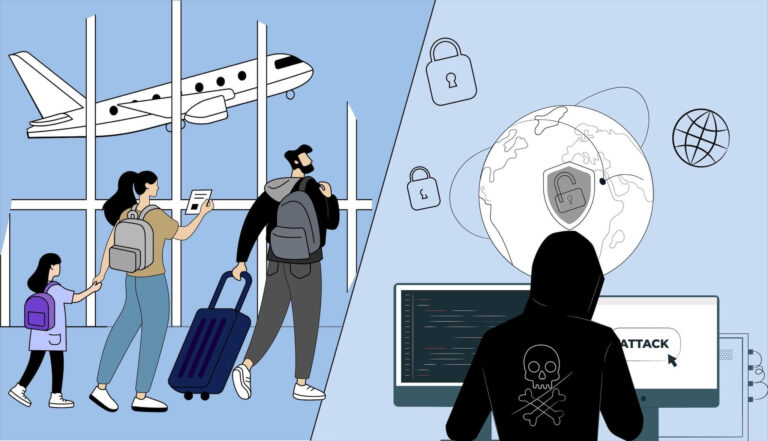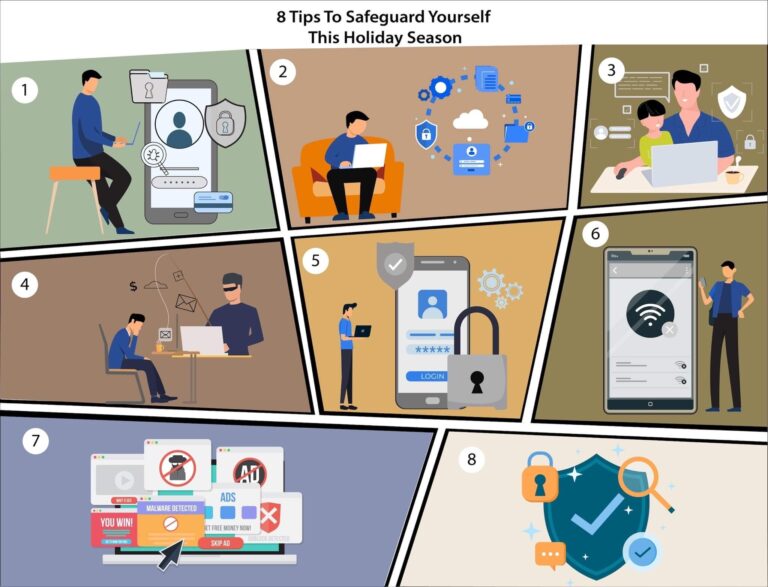



The holiday season is traditionally a golden opportunity for hackers to take advantage of the increase in the number of employees working remotely, decrease in IT staff levels, and extended server vulnerabilities.
It’s a season when the number of attacks to access your data are higher. Hackers rely on the fact that you cannot prevent these attacks due to labor shortages and focus elsewhere.
There is a higher probability of confidential customer data or sensitive information being leaked, with some organizations reporting a loss of almost US$4 million in this period.
The main reason behind these attacks is the increase in IT spending by e-commerce businesses during the holiday season, particularly around Black Friday, when online transactions increase by 40%. Cyberthieves see the holidays as a gift-giving season in their own right. They try to steal your credit card numbers and other personal information by sending emails that pretend to be special offers from shipping companies.
The holiday season is traditionally a golden opportunity for hackers to take advantage of the increase in the number of employees working remotely, decrease in IT staff levels, and extended server vulnerabilities.
It’s a season when the number of attacks to access your data are higher. Hackers rely on the fact that you cannot prevent these attacks due to labor shortages and focus elsewhere.
There is a higher probability of confidential customer data or sensitive information being leaked, with some organizations reporting a loss of almost US$4 million in this period.
The main reason behind these attacks is the increase in IT spending by e-commerce businesses during the holiday season, particularly around Black Friday, when online transactions increase by 40%. Cyberthieves see the holidays as a gift-giving season in their own right. They try to steal your credit card numbers and other personal information by sending emails that pretend to be special offers from shipping companies.

Tips To Safeguard Yourself This Holiday Season
1. Developing a password safety process:
Using a password manager allows you to create and manage multiple passwords for different accounts, making it easier for you to remember them and others who may try to hijack your account. You can use the same tool across your online accounts, or choose one that supports specific sites like Facebook, Gmail/Google Drive, and other social media platforms. Use your browser to manage passwords while changing passwords every 30-60 days. Use a combination of numbers, words, and special characters in various combinations that are easier to remember, use solid passwords suggested by the application and store them in your browser or app(phone), and use multi-factor authentication like an image or number to confirm your identity in addition to a password All these will help you secure your identity. 2
2. Ensure your personal information stays secure:
One of the most important things to do when you’re online is to keep your personal information private. This means that you should never share it with anyone unless you know and trust them. On social media, be careful about what information you put out there; don’t post anything that could compromise your identity or security (for example, passwords). And while we all know what happens when someone sees our names on Facebook—it’s called “a friend request”—it’s still a good idea not to accept any requests from strangers. Keep personal details private over the phone, too; wait until after business hours, if possible, before giving out credit card numbers or personal information during regular office hours. What are you trying to say here?); always call back instead of texting if someone calls unexpectedly (you never know who might be listening).
3. Protect your family:
● Protect your children from online dangers.
● Monitor their online activity.
● Ensure they are using the suitable device for the child’s age, including making sure that you have different passwords for each device and that you monitor what apps they download onto each one. This can help prevent your child from accessing inappropriate material or information on social media websites such as Facebook and Instagram through devices other than their own (for example, a friend’s phone). Make sure your children know how to use parental controls on devices so that you can keep an eye out for what they’re doing.
4. Be wary of suspicious emails and links:
● Spoofed or phishing emails are common scams where someone tries to trick you into giving up your personal information. They’ll ask you to click on a link that looks like it came from the bank or PayPal but instead takes you entirely elsewhere.
● Clickbait links are also misleading; they tell you something exciting but don’t lead anywhere helpful. For example, if you see an article with headlines like “25 Great Places To Visit Before You Die” or “How To Make Your Watermelon Salad,” chances are good that these articles will be full of pictures and text meant only to lure in readers who want more information about traveling abroad.”
5. Protect your devices with a password:
● Use a password that is at least eight characters long.
● Don’t use the same password for multiple accounts. If you do, it could be easier for someone else to access your account if they know what information is in it and how it’s stored. For example, if you use “password” as your login password on both Facebook and Gmail (and other websites), an attacker would only need to figure out which website gave them access before gaining complete control over them simultaneously.
● Don’t use common words or phrases that can be guessed easily by someone who knows how many letters are in each word. You should also avoid using obvious passwords such as “123456”. These types of passwords make it easy for hackers because they’re recognizable patterns, making them easy targets when trying new ones against large databases containing millions upon millions of user names/password matches – like those available online through sites like Have I Been Pwned?
6. Avoid using free Wi-Fi:
Before starting your cyber security plan, you must know the risks of using free Wi-Fi. Free Wi-Fi is only sometimes safe and can seriously threaten your data privacy and security. The risk of using free Wi-Fi is much higher than paying for an account with a paid service provider. Here are some reasons why:
● The security of using public networks is often compromised by hackers who monitor traffic on these networks and use them as launching pads for attacks on other users or companies to gain access to their systems, steal information, or hold them hostage until they pay up (which is what happened when Edward Snowden hacked into Yahoo Mail).
● Suppose someone else has already been logged onto the same network before yours. In that case, there’s no way that person can log out without resetting all their passwords– meaning they could still be accessing data while yours isn’t protected against hackers!
7. Be careful with what you share on social media:
● Don’t post personal information such as your home address or phone number.
● Don’t post pictures of yourself that could be used to identify you.
● Don’t post photos of children, pets, cars, and other items that may be easily identifiable by others.
8. Always have an antivirus program installed:
You should always have an antivirus program installed. An antivirus (AV) program will detect viruses and other malware on your device before they can harm it or your data. It’s also important to use reasonable security practices (such as password-protecting sensitive files) to protect yourself against hackers who might try to break into your computer through phishing schemes or other ways. AV programs aren’t a replacement for good security practices; they’re just one more tool available for keeping your computer secure!
Tips To Safeguard Yourself This Holiday Season
1. Developing a password safety process:
Using a password manager allows you to create and manage multiple passwords for different accounts, making it easier for you to remember them and others who may try to hijack your account. You can use the same tool across your online accounts, or choose one that supports specific sites like Facebook, Gmail/Google Drive, and other social media platforms. Use your browser to manage passwords while changing passwords every 30-60 days. Use a combination of numbers, words, and special characters in various combinations that are easier to remember, use solid passwords suggested by the application and store them in your browser or app(phone), and use multi-factor authentication like an image or number to confirm your identity in addition to a password All these will help you secure your identity. 2
2. Ensure your personal information stays secure:
One of the most important things to do when you’re online is to keep your personal information private. This means that you should never share it with anyone unless you know and trust them. On social media, be careful about what information you put out there; don’t post anything that could compromise your identity or security (for example, passwords). And while we all know what happens when someone sees our names on Facebook—it’s called “a friend request”—it’s still a good idea not to accept any requests from strangers. Keep personal details private over the phone, too; wait until after business hours, if possible, before giving out credit card numbers or personal information during regular office hours. What are you trying to say here?); always call back instead of texting if someone calls unexpectedly (you never know who might be listening).
3. Protect your family:
● Protect your children from online dangers.
● Monitor their online activity.
● Ensure they are using the suitable device for the child’s age, including making sure that you have different passwords for each device and that you monitor what apps they download onto each one. This can help prevent your child from accessing inappropriate material or information on social media websites such as Facebook and Instagram through devices other than their own (for example, a friend’s phone). Make sure your children know how to use parental controls on devices so that you can keep an eye out for what they’re doing.
4. Be wary of suspicious emails and links:
● Spoofed or phishing emails are common scams where someone tries to trick you into giving up your personal information. They’ll ask you to click on a link that looks like it came from the bank or PayPal but instead takes you entirely elsewhere.
● Clickbait links are also misleading; they tell you something exciting but don’t lead anywhere helpful. For example, if you see an article with headlines like “25 Great Places To Visit Before You Die” or “How To Make Your Watermelon Salad,” chances are good that these articles will be full of pictures and text meant only to lure in readers who want more information about traveling abroad.”
5. Protect your devices with a password:
● Use a password that is at least eight characters long.
● Don’t use the same password for multiple accounts. If you do, it could be easier for someone else to access your account if they know what information is in it and how it’s stored. For example, if you use “password” as your login password on both Facebook and Gmail (and other websites), an attacker would only need to figure out which website gave them access before gaining complete control over them simultaneously.
● Don’t use common words or phrases that can be guessed easily by someone who knows how many letters are in each word. You should also avoid using obvious passwords such as “123456”. These types of passwords make it easy for hackers because they’re recognizable patterns, making them easy targets when trying new ones against large databases containing millions upon millions of user names/password matches – like those available online through sites like Have I Been Pwned?
6. Avoid using free Wi-Fi:
Before starting your cyber security plan, you must know the risks of using free Wi-Fi. Free Wi-Fi is only sometimes safe and can seriously threaten your data privacy and security. The risk of using free Wi-Fi is much higher than paying for an account with a paid service provider. Here are some reasons why:
● The security of using public networks is often compromised by hackers who monitor traffic on these networks and use them as launching pads for attacks on other users or companies to gain access to their systems, steal information, or hold them hostage until they pay up (which is what happened when Edward Snowden hacked into Yahoo Mail).
● Suppose someone else has already been logged onto the same network before yours. In that case, there’s no way that person can log out without resetting all their passwords– meaning they could still be accessing data while yours isn’t protected against hackers!
7. Be careful with what you share on social media:
● Don’t post personal information such as your home address or phone number.
● Don’t post pictures of yourself that could be used to identify you.
● Don’t post photos of children, pets, cars, and other items that may be easily identifiable by others.
8. Always have an antivirus program installed:
You should always have an antivirus program installed. An antivirus (AV) program will detect viruses and other malware on your device before they can harm it or your data. It’s also important to use reasonable security practices (such as password-protecting sensitive files) to protect yourself against hackers who might try to break into your computer through phishing schemes or other ways. AV programs aren’t a replacement for good security practices; they’re just one more tool available for keeping your computer secure!
In today’s world, we rely on our computers more than ever. But these devices are also the most vulnerable to cyber-attacks. You must keep yourself secure from hackers so they cannot access personal information or steal from your accounts. You can do several things to protect yourself and your family from attacks like this:
● Use a password manager
● Encrypt your data with apps
● Don’t share sensitive information online.
In today’s world, we rely on our computers more than ever. But these devices are also the most vulnerable to cyber-attacks. You must keep yourself secure from hackers so they cannot access personal information or steal from your accounts. You can do several things to protect yourself and your family from attacks like this:
● Use a password manager
● Encrypt your data with apps
● Don’t share sensitive information online.





